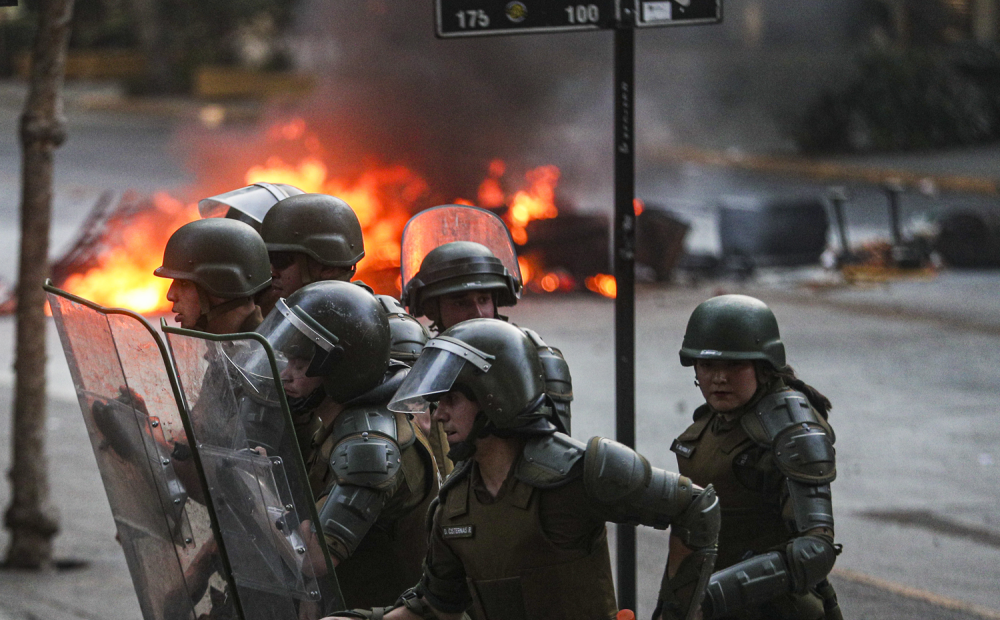Ground Truth Briefing | Protests in Chile: The Path Forward

Since mid-October, Chile has been rocked by massive protests—some marked by extreme violence, but the vast majority of them peaceful and historic in numbers. Triggered by an increase in subway fares, the protests have laid bare deep inequalities and frustration over unmet needs in one of Latin America’s most prosperous countries. The government of President Sebastián Piñera has called for a dialogue with opposition parties over measures to address the crisis. Talks are ongoing.
In this Ground Truth Briefing, a panel of noted Chilean experts discussed the underlying causes of unrest and, just as important, the path forward. Will the dialogue between the government and the opposition parties be successful? What reforms are on the table? Are there grounds for consensus, and if so, over what? How quickly will the legislature respond to measures introduced by the government or the opposition? How best can constitutional issues be addressed? How will the government address future challenges to public order in the midst of widespread criticism over human rights abuses committed by government forces?
Selected Quotes
Moderator
Cynthia J. Arnson, Director, Latin American Program
“The widespread protests in Chile have taken many by surprise, both within the country and in the international community. Chile is Latin America’s most prosperous country, and successive governments since Chile’s return to democracy in 1990—both governments of the center left and center right—have emphasized social inclusion as a core tenet of governance.”
Speakers
Felipe Agüero, Professor of Political Science, Institute of Public Affairs, University of Chile
“This mobilization needs to be seen as a very deep, profound, insistent manifestation of public frustration over the politics that have been prevalent over the past decades. It should not at all be seen as a temporary tantrum; after which we return to a previous normality, things will have to be different.”
Lucía Dammert, Global Fellow, Associate Professor, Universidad de Santiago de Chile; Expert on public security issues in Latin America
“The good news is that citizens in Chile, which were distant from any political discussion for many years; in a country in which less than fifty-percent of people actually vote, now are very much [involved] in-depth in terms of political discussions. There are discussions about the constitution, of course, but there [are] also discussions about tax reform, about social protection systems, about pension reform. These issues that were considered—four weeks ago, five weeks ago—as a technocratic type of issue to be discussed among those who know how to do it, now are discussions that are basically being developed on the streets.”
For background resources on recent events in Chile, please see:
https://www.wilsoncenter.org/sites/default/files/media/documents/page/weeklyasado1106.pdf
Speakers

Professor of Political Science, Institute of Public Affairs, University of Chile

Professor, Universidad de Santiago de Chile
Moderator

Hosted By

Latin America Program
The Wilson Center’s prestigious Latin America Program provides non-partisan expertise to a broad community of decision makers in the United States and Latin America on critical policy issues facing the Hemisphere. The Program provides insightful and actionable research for policymakers, private sector leaders, journalists, and public intellectuals in the United States and Latin America. To bridge the gap between scholarship and policy action, it fosters new inquiry, sponsors high-level public and private meetings among multiple stakeholders, and explores policy options to improve outcomes for citizens throughout the Americas. Drawing on the Wilson Center’s strength as the nation’s key non-partisan policy forum, the Program serves as a trusted source of analysis and a vital point of contact between the worlds of scholarship and action. Read more
